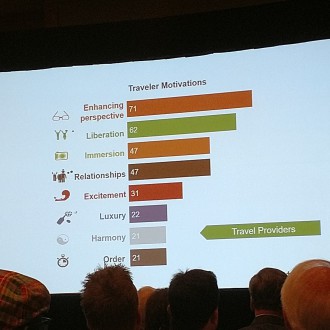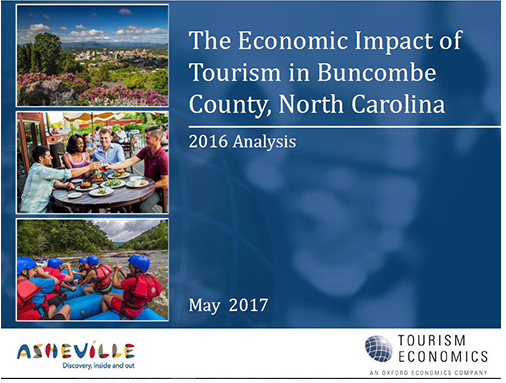As the venue for the first annual National Tourism Week Summit, Asheville had an opportunity to show off its hospitality chops to tourism industry professionals from this region and beyond. But even as local event planners welcomed the limelight, they couldn’t have known they’d get a chance to demonstrate the city’s prowess at going above and beyond in responding to the unforeseen.
Local tourism honcho Stephanie Pace Brown welcomed attendees on May 12 and explained why they were eating lunch at the Omni Grove Park Inn rather than the Renaissance Hotel downtown as planned. The night before the event, Brown said, she received an emergency phone call: A burst pipe had left the Renaissance without water service. By the next morning, Brown’s organization, the Asheville Convention and Visitors Bureau, was involved in a three-way logistics exercise to move the event to a different venue. In less than two hours, Brown said, the Renaissance and the Grove Park had coordinated an effort to relocate the lunch, meetings and cocktail reception across town.
“Little did I know how extraordinary the effort could be on our behalf, and I think it’s such a testimony to the spirit of tourism and hospitality that we’re celebrating today,” commented Brown.
Paula Wilbur, an executive at The Biltmore Co. and the chair of the Buncombe County Tourism Development Authority, agreed that the quick move highlighted many of the strengths of the hospitality industry. The joint effort of the two hotels and the CVB staff, she said, “shows you how flexible and how nimble and how creative the tourism world can be.”
Power of emotion
While lunch was served, Wilbur introduced keynote speaker Steven Paganelli of Trip Advisor. Pagnelli’s presentation focused on the importance of tapping into tourists’ emotions in order to ensure return visits. Tourism is in “the business of creating memories,” Paganelli said. “At the end of the day, it always brings me back to emotions, which is what we’re selling,” he said.

Understanding how the emotions of tourists change over the vacation experience helps to pinpoint how to make them want to come back, Paganelli explained. Promoting the tourism site as a cultural experience as well as a place to stay creates a sense of home that causes visitors to start planning their next trip before they have even ended their current one. Tourists are more apt to return to place they “love” more than just “like,” Paganelli said.
“Travel is a bit of an emotional rollercoaster,” the tourism guru explained. “It peaks upon arrival and goes downhill from there.”
Tourism boosters need to maintain tourists’ enthusiasm during the visit while keeping them emotionally connected to incentivize a return visit, he said. When he arrived in Asheville, Paganelli continued, he felt like he was somewhere different. His Uber driver offered suggestions for food and other activities — which illustrates that the best way to advertise can be through the experiences of others, he said.
2016 tourism impact
Following Paganelli’s presentation, Brown shared highlights of the 2016 Economic Impact of Tourism Analysis for Buncombe County, which was prepared by Tourism Economics, a division of the consulting firm Oxford Economics. Brown called the organization “the gold standard for measuring visitor expenditures and resulting impacts.”
Conducted every other year, Brown said the data she presented was “hot off the press,” having arrived the day before the summit.
“Tourism is a big part of Asheville’s regional economy and continues to make significant contributions to economic growth, generating business sales, employment and tax revenues,” said Brown. “In 2016, visitor spending totaled $1.9 billion. That’s money in cash registers. It generated $2.9 billion in total business sales, an increase of 6.7 percent from 2015.”
Following expansion in recreation and entertainment businesses in Buncombe County, Brown said, hospitality is now one of two industries in the county that pay workers above the state average. Earnings from tourism, she said, “[total] $810 million of personal income for people living in Buncombe County.”
In 2016, Brown said, nearly 27,000 jobs were sustained by direct, indirect or induced impacts of tourism. That amounts to one in seven Buncombe County jobs. Of those, 27 percent were in food and beverage, 17 percent in lodging, 13 percent in retail and 12 percent in recreation. Nearly a third of the tourism-related jobs (31 percent) were in “other” categories. Tourism is the county’s third-largest employment category, behind healthcare and retail.
According to the Tourism Economics report, county tourism generated $103.5 million in local taxes. Real estate taxes accounted for $49 million of the total. $31.2 million in sales taxes associated with tourism were collected. Just over $76 million in total sales taxes were generated in Buncombe County during the 2016 fiscal year, according to Jennifer Durrett of the Buncombe County Finance Department. Of the 7 percent retail sales tax collected, Durrett explained in a separate interview after the event, 4.75 percent goes to the state and 2.25 percent comes back to the county.
The 6 percent hotel occupancy tax generated $20.3 million, while assorted other taxes contributed $3 million.
By the numbers
Of the 10.9 million visitors Buncombe County hosted in 2016, 3.8 million stayed overnight — meaning most of the area’s guests were day-trippers. Over 90 percent of those folks came to the city for the purpose of leisure rather than business. International visitors made up less than one percent of the total.
The average visitor spent $107 per day, up 1.8 percent over 2015. Money spent on food and retail combined made up about half of all the money dropped by tourists, while lodging made up just over a fifth of the total, and recreation accounted for about 14 percent.
The economics report authors pointed to short-term rentals as a trend to watch, noting that the activity generated $18 million in sales during 2016.
Increased advertising funded by the hotel occupancy tax was credited with bringing new residents as well as visitors to the area. By retaining and attracting talent through tourism, Brown said, the positive impact of advertising has increased the number of those locating to Asheville to open a business, begin college or find a job. Each dollar invested in advertising results in $43 spending at local businesses, she said.
“People who saw our ads were 92 percent more favorable about Asheville as a place to start a career,” said Brown.
Will Thomas of Forge Mountain Photography — who also works with Google as a street view photographer for its online mapping services — had a table at the event to help businesses discover new advertising methods that harness changing technology.
“So many old businesses don’t have accurate listings, and we want to make sure everything has accurate listings so people can find them,” Thomas said. According to the Forge Mountain Photography website, businesses can now include interior photography of their business to their Google street view listing.
Thomas’ wife, Julie, echoed her husband’s sentiments: “This is super-important because our tourism is getting bigger and bigger, and the way people find out about things in Asheville is through the internet.”




Before you comment
The comments section is here to provide a platform for civil dialogue on the issues we face together as a local community. Xpress is committed to offering this platform for all voices, but when the tone of the discussion gets nasty or strays off topic, we believe many people choose not to participate. Xpress editors are determined to moderate comments to ensure a constructive interchange is maintained. All comments judged not to be in keeping with the spirit of civil discourse will be removed and repeat violators will be banned. See here for our terms of service. Thank you for being part of this effort to promote respectful discussion.